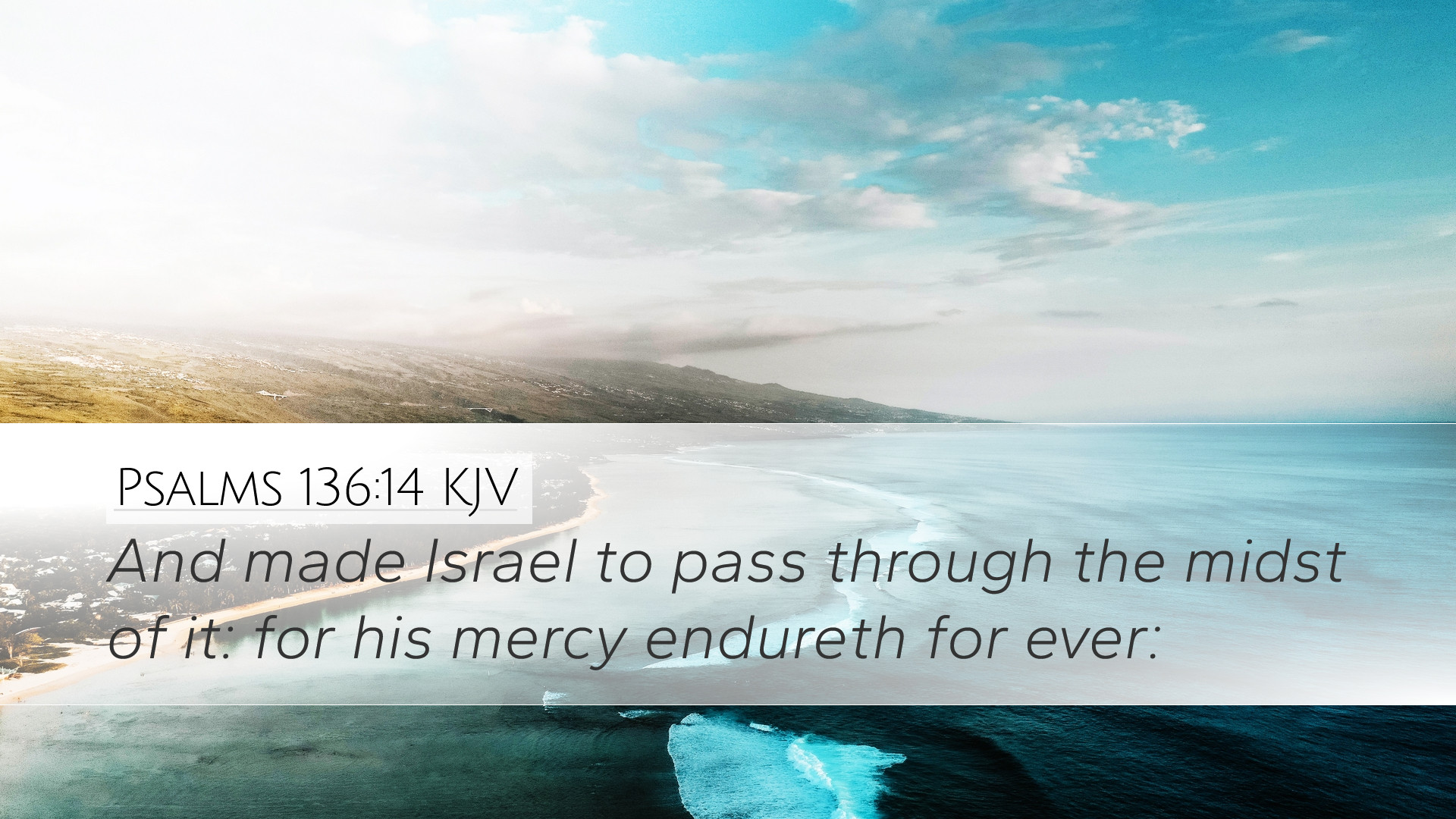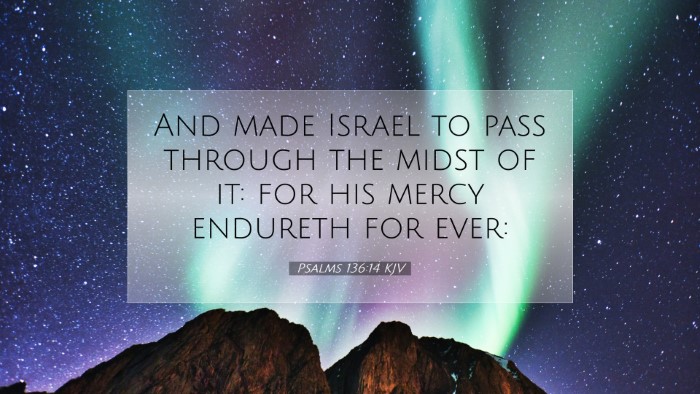Psalms 136:14 Commentary
Verse: "And made Israel to pass through the midst of it: for his mercy endureth forever."
Overview
This verse is part of a larger psalm that celebrates the mercies of God throughout Israel's history. It reflects on the miraculous events that demonstrate God's enduring mercy, particularly the exodus of the Israelites from Egypt and their passage through the Red Sea.
Historical Context
The context of Psalms 136 is a call for remembrance of Yahweh's steadfast love and acts of salvation. The psalm recounts the mighty deeds done by God on behalf of His people, focusing particularly on the events surrounding the Exodus.
Commentaries Overview
Insights from various public domain commentaries provide a rich tapestry of understanding regarding this verse. In particular, the works of Matthew Henry, Albert Barnes, and Adam Clarke offer substantial reflections on the text.
Matthew Henry's Insights
Matthew Henry emphasizes the display of God's power through the exodus narrative, pointing out that Israel’s passage through the Red Sea was not just a miraculous event but a testimony of divine protection and guidance.
- Emphasis on Mercy: Henry notes that the phrase "for his mercy endureth forever" acts as a refrain that reaffirms God’s unchanging nature and His covenantal love towards His people.
- Historical Significance: He explains that this passage through the sea symbolized a pivotal moment in Israel’s identity, marking their deliverance from slavery and their affirmation as God’s chosen community.
- Divine Faithfulness: Henry reflects on how God’s mercy is intricately tied to His faithfulness in fulfilling promises made to the forefathers - showcasing that God's actions are deeply rooted in His love and mercy.
Albert Barnes' Commentary
Albert Barnes similarly underscores the significance of God’s mercy manifested in the historical deliverance of Israel. He notes that the psalm is not only a recollection of events but a didactic tool for teaching future generations about God's faithfulness.
- The Miraculous Passage: Barnes explains that this event was crucial, demonstrating God's omnipotence in delivering His people and creating a pathway for their safe journey.
- Symbolism: He highlights the symbolism of water which represents both danger and salvation; the passage through the waters signifies moving from bondage to liberation.
- Enduring Mercy: Following Henry’s observations, Barnes reiterates the theme of God’s mercy, explaining that it is everlasting and is the basis for Israel's sustained hope and assurance.
Adam Clarke's Interpretation
Adam Clarke delves into the details of the text, providing a comprehensive analysis of the Hebrew language and the intention behind the word choices.
- Exegesis: Clarke points out that the phrase “made Israel to pass” indicates an active divine intervention. The use of 'made' reflects God’s sovereignty in orchestrating events to lead His people toward their destiny.
- Theological Implications: His discussion includes theological implications of God’s actions, linking them to themes of redemption, grace, and enduring faithfulness throughout Israel's story.
- Contextual Relevance: Clarke emphasizes the importance of understanding this text not only as a historical recount but as an ongoing narrative of God’s relationship with believers today.
Theological Themes
This verse touches upon several significant theological propositions that resonate throughout Scripture and particularly in Christian thought.
- Divine Deliverance: The act of bringing Israel through the sea is emblematic of God’s intention to secure salvation for His people—demonstrating that their liberation was by divine design.
- Covenantal Relationships: The verse further illustrates the nature of the covenant—God’s promises are characterized by steadfast love and mercy, fulfilling the role of a faithful deity.
- Hope in Adversity: The enduring mercy of God provides hope in difficult circumstances, encouraging believers to trust in His ongoing sovereignty and providence.
Practical Application
For pastors, students, theologians, and scholars, this verse and its commentary encourage a deeper reflection on God’s mercy.
- Preaching Themes: This text can be used to emphasize themes of hope, divine intervention, and the historical faithfulness of God in sermons.
- Encouragement for Believers: Believers are reminded that God’s enduring mercy is applicable in their daily lives, offering comfort and assurance amidst trials.
- Intertextual Reflections: Scholars can explore intertextual connections within the wider biblical corpus regarding themes of deliverance and mercy, often recalling New Testament fulfillments.
Conclusion
Psalms 136:14 serves as a powerful reminder of God’s eternal mercy displayed in the historical narrative of Israel. Through the insights of Henry, Barnes, and Clarke, we gain a multifaceted understanding of deliverance that not only informs us of past events but also guides our present faith and future hope. It calls upon scholars and believers alike to acknowledge and celebrate the unwavering mercies of God that endure forever.


